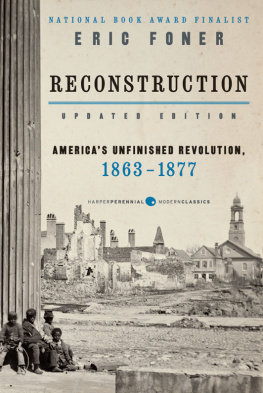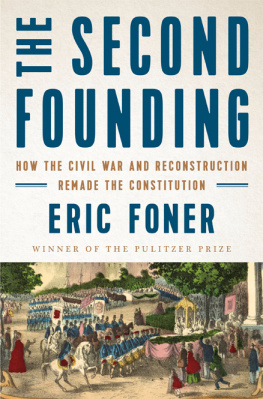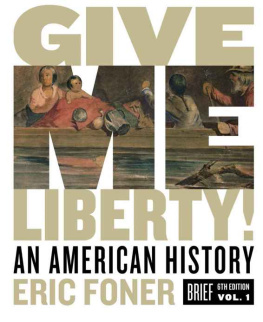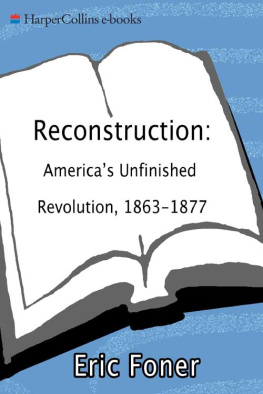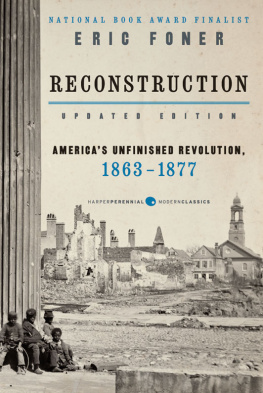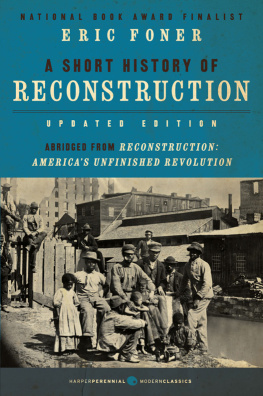ACAnnual Cyclopedia
AgHAgricultural History
AHRAmerican Historical Review
AI HQAlabama Historical Quarterly AMAAmerican Missionary Association
ArkHQArkansas Historical Quarterly
ASDAHAlabama State Department of Archives and History
CGCongressional Globe
CRCongressional Record
CWHCivil War History
DUDuke University
ETHSPEast Tennessee Historical Society Publications F1HQFlorida Historical Quarterly FSSPFreedmen and Southern Society Project, University of Maryland (with document identification number)
GaHQGeorgia Historical Quarterly
GDAHGeorgia Department of Archives and History
HLHuntington Library
HSPaHistorical Society of Pennsylvania
HUHoughton Library, Harvard University
IndMHIndiana Magazine of History
JAHJournal of American History
JEcHJournal of Economic History
JISHSJournal of the Illinois State Historical Society
JMHJournal of Mississippi History
JNHJournal of Negro History
JSHJournal of Southern History
JSocHJournal of Social History
LaHLouisiana History
LaHQLouisiana Historical Quarterly
LCLibrary of Congress
LMLLawson McGhee Library
LSULouisiana State University
MDAHMississippi Department of Archives and History
MHSMassachusetts Historical Society
MoHRMissouri Historical Review
MVHRMississippi Valley Historical Review
NANational Archives
NCHRNorth Carolina Historical Review
NCDAHNorth Carolina Division of Archives and History
NYPLNew York Public Library
Of/QOhio Historical Quarterly
PaHPennsylvania History
PaMHBPennsylvania Magazine of History and Biography
PMHSPublications of the Mississippi Historical Society
RG 105Record Group 105: Records of the Bureau of Refugees, Freedmen, and Abandoned Lands
RG 393Record Group 393: Records of the United States Army Continental Commands
SAQSouth Atlantic Quarterly
SCSophia Smith Collection, Smith College
SCDASouth Carolina Department of Archives
SCHMSouth Carolina Historical Magazine
SCHSSouth Carolina Historical Society
SHSWState Historical Society of Wisconsin
SSSouthern Studies
SWHQSouthwestern Historical Quarterly
THQTennessee Historical Quarterly
TSLATennessee State Library and Archives
UGaUniversity of Georgia
UNCSouthern Historical Collection, University of North Carolina
USCSouth Caroliniana Library, University of South Carolina
UTxEugene C. Barker Texas History Center, University of Texas
VaMHBVirginia Magazine of History and Biography
WMHWisconsin Magazine of History
WVaHWest Virginia History
The New
American Nation Series
EDITED BY
HENRY STEELE COMMAGER
AND
RICHARD B. MORRIS
P ROBABLY no other chapter of American history has been the subject, one might say the victim, of such varied and conflicting interpretations as what attempts to give unity and coherence to the era we call Reconstruction. Even the chronology is chaotic. Did the process begin with the bizarre creation of West Virginia in 1861or should that be dated 1863? Did it conclude with the Compromise of 1877 or was its true conclusion Brown v. Topeka in 1954? Was its central theme politicalthe reconstruction of the old Union, or was it legal and constitutionalthe revolutionary Fourteenth Amendment that still functions as an instrument of revolution? Was its central theme social and moralthe end of slavery, or did the realities of slavery persist for another half century or more? Was its significance fundamentally in what has been called the Emergence of Modern Americainto the Triumphant Democracy that Andrew Carnegie celebrated, or was it rather the emergence of America to world poweror certainly to Pacific power? Or might it all be interpreted in philosophical termsthe Age of Darwin and Spencer, of Lester Ward and William James, who contributed so much to reconstructing American thought?
Reconstruction embraced, of course, all these chapters of our historya conclusion illustrated by successive generations of historians from James Ford Rhodes, Ellis Oberholtzer, John W. Burgess, and Vernon Parrington to the schools of William Dunning, W.E.B. Du Bois, Walter Fleming, and Allan Nevins.
It is to this distinguished lineage of Reconstruction scholars that Professor Foner belongs, and in nothing is he more distinguished than in his independence and originality. The most striking feature of that independence is his insistence that the Negro was the central figure and the most effective in Reconstruction: in this he was, to be sure, anticipated by the great Negro leader, Du Bois. To the support of his thesis, Mr. Foner has brought a prodigious body of evidence, organized it not only skillfully but also, we may almost say, with stylistic genius, and produced what is a scholarly convincing reconstruction of what is indubitably the most controversial chapter in our history.
H ENRY S TEELE
C OMMAGER R ICHARD B. M ORRIS
R EVISING interpretations of the past is intrinsic to the study of history. But no part of the American experience has, in the last twenty-five years, seen a broadly accepted point of view so completely overturned as Reconstructionthe violent, dramatic, and still controversial era that followed the Civil War. Since the early 1960s, a profound alteration of the place of blacks within American society, newly uncovered evidence, and changing definitions of history itself have combined to transform our understanding of race relations, politics, and economic change during Reconstruction. Yet despite this change in consciousness, so to speak, historians have yet to produce a coherent new portrait of the era.
The scholarly study of Reconstruction began early in this century with the work of William Dunning, John W. Burgess, and their students. The interpretation elaborated by the Dunning School may be briefly summarized as follows. When the Civil War ended, the white South genuinely accepted the reality of military defeat, stood ready to do justice to the emancipated slaves, and desired above all a quick reintegration into the fabric of national life. Before his death, Abraham Lincoln had embarked on a course of sectional reconciliation, and during Presidential Reconstruction (186567) his successor, Andrew Johnson, attempted to carry out Lincolns magnanimous policies. Johnsons efforts were opposed and eventually thwarted by the Radical Republicans in Congress. Motivated by an irrational hatred of Southern rebels and the desire to consolidate their partys national ascendancy, the Radicals in 1867 swept aside the Southern governments Johnson had established and fastened black suffrage upon the defeated South. There followed the sordid period of Congressional or Radical Reconstruction (186777), an era of corruption presided over by unscrupulous carpetbaggers from the North, unprincipled Southern white scalawags, and ignorant freedmen. After much needless suffering, the Souths white community banded together to overthrow these governments and restore home rule (a euphemism for white supremacy). All told, Reconstruction was the darkest page in the saga of American history.


